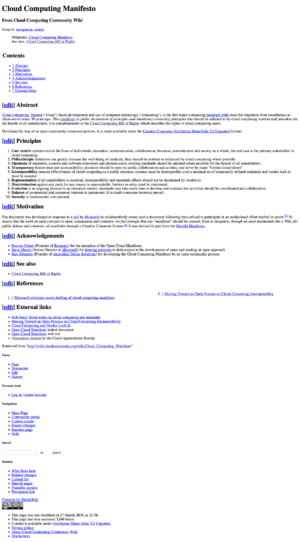2009 - Cloud Computing Manifesto - Reuven Cohen, Steve Martin, Sam Johnston
Texto
Cloud Computing Manifesto
From Cloud Computing Community Wiki
Abstract
Cloud computing, Internet ("cloud") based development and use of computer technology ("computing"), is the first major computing paradigm shift since the migration from mainframes to client-server some 30 years ago. This manifesto (a public declaration of principles and intentions) covers key principles that should be adhered to by cloud computing vendors and providers for the benefit of all stakeholders. It is complementary to the Cloud Computing Bill of Rights which describes the rights of cloud computing users.
Developed by way of an open community consensus process, it is made available under the Creative Commons Attribution ShareAlike 3.0 Unported license.
Principles
1. User centric systems enrich the lives of individuals, education, communication, collaboration, business, entertainment and society as a whole; the end user is the primary stakeholder in cloud computing.
2. Philanthropic initiatives can greatly increase the well-being of mankind; they should be enabled or enhanced by cloud computing where possible.
3. Openness of standards, systems and software empowers and protects users; existing standards should be adopted where possible for the benefit of all stakeholders.
4. Transparency fosters trust and accountability; decisions should be open to public collaboration and scrutiny and never be made "behind closed doors".
5. Interoperability ensures effectiveness of cloud computing as a public resource; systems must be interoperable over a minimal set of community defined standards and vendor lock-in must be avoided.
6. Representation of all stakeholders is essential; interoperability and standards efforts should not be dominated by vendor(s).
7. Discrimination against any party for any reason is unacceptable; barriers to entry must be minimised.
8. Evolution is an ongoing process in an immature market; standards may take some time to develop and coalesce but activities should be coordinated and collaborative.
9. Balance of commercial and consumer interests is paramount; if in doubt consumer interests prevail.
10. Security is fundamental, not optional.
Motivation
The document was developed in response to a call by Microsoft to collaboratively create such a document following their refusal to participate in an undisclosed effort drafted in secret.[1] To ensure that the work on such a project is open, transparent and complete, we feel strongly that any "manifesto" should be created, from its inception, through an open mechanism like a Wiki, for public debate and comment, all available through a Creative Commons license.[2] It was derived in part from the Mozilla Manifesto.
Acknowledgements
- Reuven Cohen (Founder of Enomaly) for the inception of the Open Cloud Manifesto
- Steve Martin (Senior Director at Microsoft) for drawing attention to deficiencies in the development of same and seeding an open approach
- Sam Johnston (Founder of Australian Online Solutions) for developing the Cloud Computing Manifesto by an open community process
See also
- Cloud Computing Bill of Rights.
References
[1] Microsoft criticizes secret drafting of cloud-computing manifesto.
[2] Moving Toward an Open Process on Cloud Computing Interoperability.
External links
Bob Sutor: Some notes on cloud computing and standards.
Moving Toward an Open Process on Cloud Computing Interoperability.
Cloud Computing and Vendor Lock-In.
Open Cloud Manifesto leaked document.
Open Cloud Manifesto web site.
Alternative version by the Cloud Appreciation Society.
Contexto
Autoras
Archivo
Archivo:Cloud Computing Manifesto - Cloud Computing Community Wiki.pdf
Fuentes
Enlaces
Primera edición:'
Wayback Machine: https://web.archive.org/web/20090423161829/http://wiki.cloudcommunity.org/wiki/Cloud_Computing_Manifesto
Wikipedia: https://en.wikipedia.org/wiki/Cloud_Computing_Manifesto
Ver también:
